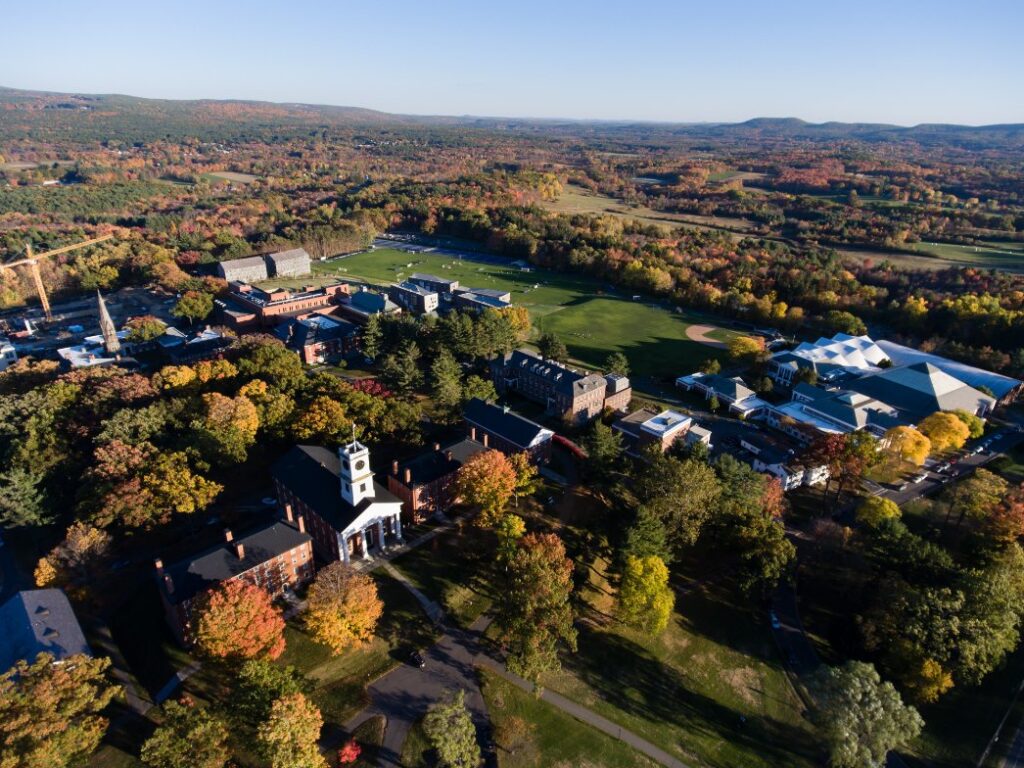Issues & Analyses: Other Northeast College Towns Receive Much Larger PILOT Payments Than Amherst

Amherst College. Photo: amherst.edu
Last year Amherst College gave the town of Amherst an unrestricted donation of $130,000, its largest gift in recent years. This may seem like a magnanimous gesture, and in a sense it is, since the college did not have to give the town anything. However, consider these statistic
- Amherst College reports an endowment valued at $3.3 billion, ranking it among the top 1% of the wealthiest colleges and universities in the country.
- Amherst College’s endowment per student is $1.2 million, placing it in the top ten nationally.
- 41% of Amherst College students come from the top 5% of earners nationally.
- The Amherst College president’s salary was reported in 2011 to be $589,000, ranking it 11th nationwide in presidential compensation per student.
- The Amherst College main campus carries a tax-exempt appraisal of $367 million in the most recent valuation.
- If this Amherst College property were taxed at the regular residential rate of $20.97, its annual assessment would be $7.7 million.
- Amherst College’s finances have never looked better. During the fiscal year ending on June 30, 2020, the college’s endowment grew by about $90 million after expenditures. That’s just about the entire town budget.
- Only one student from ARHS was admitted to Amherst College according to ARPS data in 2022.
- UMass reimburses the town for Fire/EMS calls, although not for police calls and other emergency service calls (CRESS, Animal Control, DPW). Amherst College contributes nothing to assist in providing safe staffing levels for Amherst Firefighters or reimbursement for other emergency responses.
This is the most recent data I could find related to Amherst College’s payment to the town. UMass and Hampshire have similar issues, but are less well-off. The town fully maintains some of the sidewalks and all the roads abutting the campuses. Off-campus students rely on major services such as police, fire, and public works.
PILOT Payments Elsewhere In The Northeast
Compare these voluntary payments (sometimes called Payment in Lieu of Taxes or PILOT payments) from other prominent institutions:
a. In 2012 Brown University agreed to give Providence $31 million over 11 years.
b. Boston University contributes more than $6 million per year in PILOT payments
c. Yale University gives New Haven roughly $8 million per year in voluntary payments
d. Williams College has made an average of $900,000 in annual contributions to Williamstown over the past decade. It recently agreed to fund a $5 million endowment for Mt. Greylock School District capital projects. In 2006 it started a similar fund for Williamstown Elementary School that is now valued at $1.5 million. (Could we do this for our new Elementary School Project?)
e. UMass Lowell pays $1 million per year to the city of Lowell and has only 18,000 students (vs. nearly 29,000 at UMass Amherst). (From Janet McGowan)
f. “In 2021, Princeton University paid $11.3 million in property and sewer taxes to the town of Princeton. Of the $11.3 million property tax payment to Princeton, $4.8 million went to the Princeton Public Schools, and about $6.2 million was paid on property that is eligible for exemption under state law.” (from Jennifer Taub)
Where Do We Go From Here?
Perhaps the town should be seeking larger PILOT payments from the three educational institutions that it hosts. The question, “Why are Amherst’s PILOT payments so comparatively low?” ought to be answered.
The average family income of a student at Amherst College is $158,000 per year. That is over double Amherst’s AMI of $61,000, yet a resident earning $61,000 per year pays far more in taxes than Amherst College or its students do. Could we create a user fee for students to use town services if their family makes above a certain income?
At times our town does not have emergency services available for residents when students require all of them. There ought to be remedies for this.
Amherst College owns almost the entire neighborhood across from their campus
(Walnut, South Pleasant, Orchard, Hitchcock, Woodside, Snell, etc) Many of these homes are valued by the town at under $400,000, are untaxed (?), and could be used to help provide affordable housing for town staff, educators, and other middle and working class professionals who wish to purchase a home here.
The town has a great bargaining chip, which is auditing how much it costs the town to provide currently uncompensated services and refusing to provide said services if it does not get PILOT for them. The fact that our town’s taxes are not structured to have our educational institutions contribute their fair share is quite an unfortunate surprise.
The three college’s are responsible for nearly 50% of greenhouse gas emissions in Amherst, more than doubling the pollution emitted by any other sector alone, including municipal, residential buildings, transportation and business. This is an added hidden cost to the town.
–
–
–

Julian Hynes,
Thank you for this article. I have been involved in the fight for PILOT payments and working on state legislation filed by Senator Gomez and Rep Uyterhoeven. Senate Bill 1836 and H 2963 call for mandatory PILOT payments to towns by the large institutions. The Joint Revenue Committee will be holding a hearting Thursday, June 22 at 1 PM.